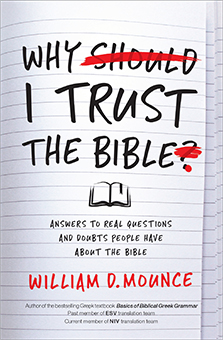
Faith in the Goodness of God
The Bible claims that God is loving and all powerful. Yet we all know from personal experience that evil still exists in the world. We must admit that part of the question of the presence of evil and the biblical claim of the love and power of God simply cannot be answered. We are called, by faith, to hold the presence of evil and the character of God in tension. We are called to believe that, along with the martyred saints, we will someday confess, “Just and true are your ways, King of the nations” (Revelation 15:3).
The writer of the Old Testament book of Habakkuk asks why there is injustice in the world, and God answers that evil will eventually be punished. In the meantime, the righteous person will live by their faith (Habakkuk 2:4 ESV), believing that God will punish evil. Hearing this, Habakkuk responds with his beautiful statement of faith:
Though the fig tree does not bud
and there are no grapes on the vines,
though the olive crop fails
and the fields produce no food,
though there are no sheep in the pen
and no cattle in the stalls,
yet I will rejoice in the Lord,
I will be joyful in God my Savior.
Habakkuk 3:17–18
Part of the answer to the problem of pain is that God requires us to have faith in his goodness despite the presence of pain.
One of the reasons faith is required to live as a believing Christian is because there is so much we don’t understand about evil, and according to the books of Job and Habakkuk, this ignorance is by God’s design. We don’t know where Satan came from. God must have created him, since God created all things (Colossians 1:16), but why did God create Satan? If Satan is an angel, why did God allow him and his followers to fall? And couldn’t God have made the world in such a way that humans could make their own choices, but evil choices were not an option? While we’re on this earth, we can’t ultimately know why there is evil in this world. Certainly, most of us have rightly said at one time or another that evil doesn’t make sense. Ultimately, evil does not make sense,[1] and apparently, we don’t need to know where it came from, or, ultimately, why God continues to allow it to happen.
Whenever we talk about pain and suffering, that conversation must be held up against the backdrop of heaven. Pain often forces our heads down, looking only to ourselves in the present, focusing on the reality of the pain. Faith lifts our heads up, acknowledging the pain of the present but vowing to see it in the light of the future, in light of eternity. This is what Paul meant when he wrote to the church in Rome, “I consider that our present sufferings are not worth comparing with the glory that will be revealed in us” (Romans 8:18). He wrote the church in Corinth, “For our light and momentary troubles are achieving for us an eternal glory that far outweighs them all. So we fix our eyes not on what is seen, but on what is unseen, since what is seen is temporary, but what is unseen is eternal” (2 Corinthians 4:17–18). Someday the tension between earthly evil and God’s goodness will make sense, but until then we live by faith.
To the non-Christian, I understand that this whole discussion about faith appears to sidestep the issue. Pain and suffering are here and now, and we need an answer here and now, or so they claim. However, for the Christian, we are content to live by faith, acknowledging that someday this world will all make sense, as difficult as it is to accept when there is so much pain and suffering everywhere in the world—and in our own homes—right now. The Bible teaches that, “without faith it is impossible to please God, because anyone who comes to him must believe that he exists and that he rewards those who earnestly seek him” (Hebrews 11:6). Part of our heavenly reward will certainly be a clear understanding of the character of God and the world as we experienced it.
By Bill Mounce
[1] This point is made repeatedly by Clay Jones, Why Does God Allow Evil? Compelling Answers for Life’s Toughest Questions (Eugene, OR: Harvest House, 2017).

Why I Trust the Bible
We are often told we can no longer assume that the Bible is trustworthy. From social media memes to popular scholarship, many attacks have been launched on the believability of Scripture. Why I Trust the Bible: Answers to Real Questions and Doubts People Have about the Bible offers a clear guide to help you answer doubters questions in a way that leads to a deeper appreciation for the truth and relevance of the Bible
Learn More






I am encouraged by this word.
Thank you for this teaching. God bless you.
I’m here from Facebook. I am interested in the program.
Welcome Joseph! Scroll down to the bottom of the page or use this link to sign-up to receive news of the weekly article in your email: https://www.thenivbible.com/niv-blog-signup-form/